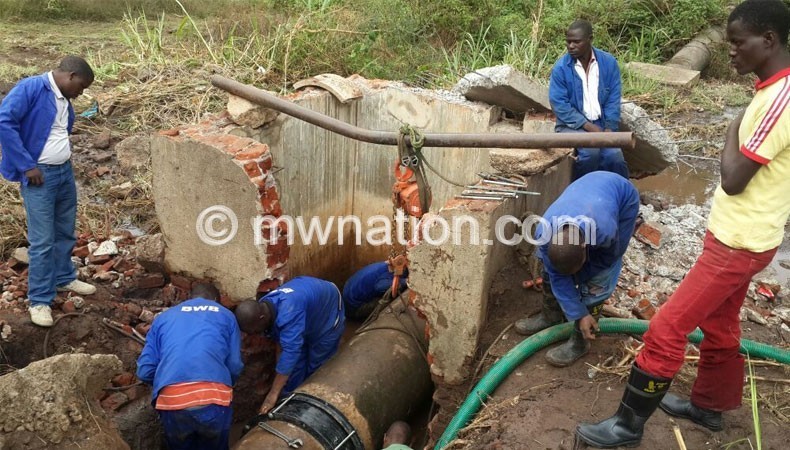Water boards employees threaten shutdown
Employees from the country’s five water boards are pressing on government to increase their salaries by 20 percent, failing which they are threatening a strike or lockout.
While the Comptroller of Statutory Corporations Nwazi Mnthambala has said the increment can only be considered when performance in these institutions improves, leader of the five water boards’ chairperson Ibrahim Matola, has refused to comment on the stand-off.

The stand-off, which started in November 2020, has since seen Water Employees Trade Union of Malawi (Wetum) writing the Ministry of Labour to intervene with speed—before they go for ‘a lawful strike or a lockout’, which would be catastrophic in accessing potable water in the country.
Correspondence we have seen shows that the employees, operating under Wetum, have been engaging their employers, water boards [Water Services Association of Malawi—Wasama], and the Comptroller of Statutory Corporations.
On November 18 2020, the Wetum executive and water boards chief executive officers met in Salima, where the workers were told that the increment would not be made, as had earlier been directed by government.
Wetum, through secretary general Gomezgani Thyangathyanga wrote Wasama, asking it to still effect the increment despite resistance from Capital Hill. They demanded a response by December 1 2020.
Wetum’s letter reads, in part: “Water Boards submitted detailed and manageable budgets to guide their operations; therefore, it is improper to be denied salary increment. The directive not to increase salary is uncertain, taking into account the current economic hardships.
“The high cost of living affects all employees regardless of sector and workplace. Therefore, Wetum is proposing approval of 20 percent salary increment by government and rescind the directive not to increase salaries for water boards.”
Wetum also wrote another letter to Mnthambala on November 23, to which she responded on December 14, insisting that government will not bow down to their 20 percent increase demand.
“Government, after wider consultations and analysis of the situation in most water boards, has for the time being decided not to grant the request. This decision is withheld until such time that performance and situation of the boards improves.
“Government position, therefore, remains the same of awarding a five percent notch movement for all permanent staff across all parastatals in the 2020/2021 financial year, including the five water boards under Wasama.”
Following the rejection, the Wetum executive on December 23 2020, held discussions with all water boards chairpersons, further giving them up to January 12 2020 to provide feedback on their request, which has not yet been provided.
As a result, Wetum, through Thyangathyanga, has written Secretary for Labour, requesting government to intervene before they conduct a strike or a lockout.
Reads, in part, the letter dated January 13 2020: “Wetum has not received feedback from chairpersons up to now and the issue of salary adjustment has not been resolved and we are declaring a dispute as per Labour Act, Part V [Section 42 to 54] and per our collective bargaining agreement with management.
“In conclusion, Water Employees Trade Union of Malawi has exhausted all avenues with CEOs and board chairpersons and is officially requesting your office to intervene before a lawful strike or a lockout.”
In an interview yesterday, Matola said he would not be commenting on the matter as he does not speak for Wetum.
“If Thyangathyanga wants to go on strike, that’s him, not for me. I will not comment on behalf of Wetum. Didn’t you see a letter which Thyangathyanga wrote, saying there would be no strike? So, as chairperson, I will not comment on these matters,” he said.
Chief Labour Commissioner Hlalerwayo Kelvin Nyangulu said he was yet to see the correspondence from Wetum; otherwise consulting them to intervene was procedural, according to labour laws.
“Let us not scare people that employees from water boards are going on strike. I haven’t seen their letter to us, apart from what I see in the social media. But if you say they have written us, that is the procedure.
“We will look at the matter and advise them on how it can best be handled. Consulting us is part of the process in the labour laws and they are following that,” he said.
All the five water boards—Northern Region Water Board (NRWB), Central Region Water Board (CRWB), Lilongwe Water Board (LWB), Southern Region Water Board (SRWB) and Blantyre Water Board (BWB)—are owed K30 billion, in bills, by government ministries, departments and agencies (MDAs).
According to Wetum, SRWB is owed K9.3 billion out of which K7.2 billion is among MDAs; BWB is owed K5 billion by government and State residences owe it K2.2 billion. The remaining K2.8 billion is with ministries of Health and Education.
CRWB, according to Wetum is owed K4.9 billion while LWB is owed K9 billion, out of which 97 percent is shared between Malawi Defence Force and Malawi Police Service.
The unpaid bills, coupled with intermittent power supply, lack of projects, profitability, losses to non-revenue water, water quality, inadequate water sources and aged infrastructure are stifling operations of the boards to effectively deliver water and sanitation services.





